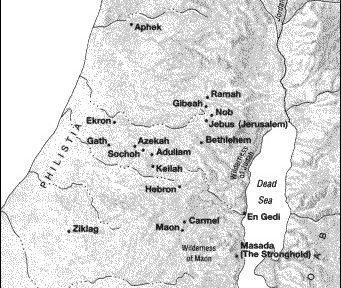This Psalm, as was Psalm 17, is set in a courtroom. Deuteronomy 19.16-17 provides the instruction on how to bring this dispute to court. Job 23.2-7 shows how Job handled a similar situation.
This Psalm is also the first of the imprecatory psalms (35; 52; 58; 59; 69; 79; 83; 109; 137; 140). These psalms are cries to God to bring destruction on those who stand against God and God’s people.
Verses 1-3-David once again calls for God to be his vindication, his salvation. He is calling for God to go to war for him on account of those who pursue him. As the psalm is read, it appears as though this prayer is concerning Saul more so than the others who pursued him. He mentions his mourning for their losses in verse 13-14 as if they were close.
Verses 4-6-David’s prayer is for God to drive his enemies away, even to the point of destruction. This is a common theme in Scripture (Job 21.18; Psalm 35.19-21; 40.14-15, 70.2-3; 83.13; 129.5; Isaiah 29.5; and Jeremiah 23.12). God will discipline His children and will judge those who refuse Him. In this case, He could be disciplining David and judging those who have judged David. In all this, God is righteous. He knows the hearts and intentions of those whom He judges. Could verse six be a reference to the pre-incarnate Christ?
Verses 7-8-David is asking God to judge them in the manner they attempted to judge him. They sentenced David to death and laid traps for them. David is asking that God do the same for them (Matthew 7.1-2). There are many prayers and judgments like this throughout the Scripture (Psalm 9.15; 55.23; Isaiah 47.11; and 1 Thessalonians 5.3). Remember that God knows the intentions of the heart and judges righteously.
Verses 4-9 present a sevenfold curse or malediction against those who afflict and oppose David that sounds vengeful. However, is more a cry for God to bring, to judge the evil doers by returning their own evil upon themselves. Since God is the only one who can do this justly, David cries out for God to do so.
Verses 9-10-David proclaims he will do what he should already be doing, he will praise God. Deliverance is reason for praise. As God helps you, do you praise Him? At what point should you praise Him? Should it be after He delivers or in anticipation for the help? Again, this is a common theme in Scripture (Exodus 15.11; Psalm 71.19; 86.8; and Micah 7.18) because God is worthy of praise for He is unlike all others.
Verses 11-14-David is accused of things of which he has no idea. He is speechless because he does not know about what they are accusing him. The principle he presents here is Scriptural (Job 30.25; Psalm 38.20; 109.5; Jeremiah 18.20; John 10.32; and Romans 12.14-21). Is this something we do? When people seek us harm, do we pray for them, help them, mourn with them? Or, do we behave as the world does (Psalm 35.15-16)?
Verses 15-16-The world would rather taunt those who are their enemies than help them. How do you behave when others treat you poorly (Matthew 5.38-48)?
Verses 17-18-David is asking God to do what God is going to do. He is requesting God to do it now. He proclaims that he will praise God for doing this now. Is it wrong to pray this way? Is it wrong to ask God to do something now instead of later? From this Scripture? No. There are other places where biblical writers asked the same thing and based it on Scripture (Psalm 13.1 and Habakkuk 1.13). When we base our prayers and request on Scripture, God answers.
Verses 19-21-Refer to verses 4-6 above for thoughts on these verses. David is describing his persecutors in these verses. They are worthless and wicked (Proverbs 6:12–14 and 10:10). These words are used in Mark 15:29–30 as a derision against Jesus. Are people unjustly accusing you of things you have not done because of the good you stand for or do they justly accuse you?
Verses 22-25-As in the beginning, David is calling God to defend him before his accusers. Whom do you ask to defend you?
Verse 26-David again calls for God to judge those around him with righteous judgment (see verses 17-18 above).
Verses 27-28-David needs someone to mourn with him and to rejoice with him (Romans 12.15). Are you that someone for others? Whatever circumstances you find yourself in, can you proclaim the greatness of God? Do you do this all day?
